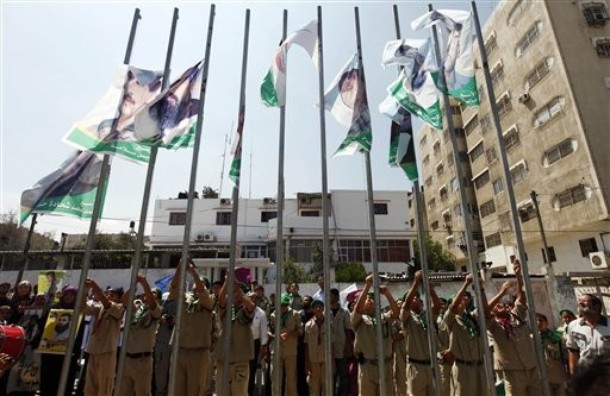
As Israel prepares to conduct its official inquiry into the recent Israeli Defense Force (IDF) raid on the flotilla attempting to breach the blockade against Gaza, it is important to understand how this tragic incident affects U.S. national security interests in the Middle East. The episode highlights the difficulty in balancing Israel’s legitimate security requirements against the current situation in Gaza that President Obama has called “unsustainable.”
The newly released U.S. National Security Strategy seeks “two states living side by side in peace and security—a Jewish state of Israel, with true security, acceptance, and rights for all Israelis; and a viable, independent Palestine with contiguous territory that ends the occupation that began in 1967 and realizes the potential of the Palestinian people.” This is a laudable goal, but as the prospects for a comprehensive Middle East peace agreement appear further away than ever, one has to wonder how we can get there from here.
Coincidentally, I was in Israel during the flotilla incident participating in an academic fellowship that focused on terrorism and Israel’s counter-terrorism efforts. I was struck by the contrast between the international media’s coverage of the tragedy, most of which included outrage and condemnation of Israel’s actions, and Israel’s comparatively unsuccessful attempts to present its side of the story.
From Israel’s perspective, the naval blockade is permissible under international law and necessary in order to prevent the delivery of rockets and other weapons into Gaza that could then be used against Israel.
Our group was briefed on the flotilla operation by an IDF representative, who claimed that 67 individuals aboard the Mavi Marmara were affiliated with the Turkish Humanitarian Relief Foundation (I.H.H.) – an organization with alleged ties to terrorism. Additionally, the briefing included video footage aboard the ship that appeared to show deliberate preparations by the activists for confrontation with the IDF Navy SEALS.
However, if the strategic objective for the flotilla’s organizers was to legitimize Hamas in the eyes of the world, one has to conclude that the attempt to breach the blockade largely succeeded despite the fact that the Israeli Navy intercepted and stopped all six vessels.
Our group was allowed to visit a number of Israeli police and military units, including some with special missions and unique capabilities. I was impressed with their proficiency in conducting counter-terrorism operations. For them, the terrorist threat is not some academic exercise, but a reality that they face on a daily basis as they defend their families and homeland. Additionally, our group visited a maximum security prison facility that housed a number of “terrorists,” including members of Hamas and Fatah. We were allowed to speak with them and I was struck by their sincere belief that “we (Palestinians) are the innocent victims here.”
I walked away from the experience with a sense of pessimism concerning the possibility of finding areas of agreement and the flotilla incident has only served to widen the gulf between Israelis and the Palestinians.
In addition to greater international awareness and support for Gaza’s humanitarian situation, the crisis also seems to have rallied many Israelis to their government. Consider a recent poll conducted by Pechter Middle East Polls after the flotilla incident that found 53% of respondents were satisfied with Prime Minister Netanyahu’s job performance, compared with 40% that are dissatisfied. Additionally, 73% of respondents do not think that Israel should open up Gaza for humanitarian shipments (Israel has offered its naval base at Ashdod as an alternative).
All of this is detrimental to U.S. national security interests and has wider regional implications as General Petraeus, the commander of U.S. Central Command, is well aware. In written testimony for the Senate Arms Services Committee months before the latest incident, he expressed concerns about Israeli-Palestinian tensions leading to increased anti-American sentiment because of the perception that the U.S. favors Israel, Arab anger that limits U.S. opportunities to partner with governments and peoples in the region, and al Qaeda and other groups that seek to exploit this anger in order to mobilize support.
Despite the fact that the U.S. is the largest bilateral donor of humanitarian aid in Gaza and is expected to announce additional assistance in both Gaza and the West Bank, the situation remains tense. President Obama was right to call for a full investigation and the Israeli government is moving forward with an independent public commission (known as the Turkel committee) that includes two senior foreign observers. We have already seen a shift in Israeli policy that lifts some of the restrictions on goods entering Gaza in an effort to ease international tensions.
Unfortunately, the currently strained U.S. – Israeli relationship, Turkey’s outrage at Israel’s behavior, and skeptical governments in the Middle East make the prospects for a comprehensive peace agreement seem unlikely anytime soon. That said, in my view President Obama’s National Security Strategy offers a viable, equitable solution and the administration should press ahead, working in concert with regional and global allies. Clearly, this will require patience and a real commitment by all parties to achieve peace, but the alternative is “more of the same” in a most volatile region of the world.
Jim Cook is a Professor of National Security Affairs at the U.S. Naval War College in Newport, Rhode Island. He specializes in Strategy, Force Planning and the Middle East. A recently retired Army officer who served in a variety of command and staff assignments over a 24-year military career, his last assignment before arriving at Newport included a deployment as the Deputy CJ3, CJTF-76, Operation Enduring Freedom, Afghanistan. The views expressed in this article are his own. Photo credit: AP Photo
Image: gaza62110.jpg
